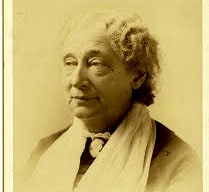Zerelda Sanders Wallace, step-mother to Lew Wallace, died in 1901. She was a gifted and much sought after speaker for the causes she believed in. She was in such demand and responded to so many requests that she nearly killed herself in 1891 trying to balance her public and private commitments.
In September of 1891, Zerelda was speaking in Shannon, Illinois on the return leg of an extensive tour. She had spoken throughout the tour and on the previous evening she gave a vigorous presentation in Freeport, Illinois. The morning after the Freeport talk she boarded a train to Shannon at 8:00 a.m. and upon arrival spoke for over an hour to the local chapter of the Women’s Christian Temperance Union (WCTU). Her evening program had been widely promoted and she arrived at the venue, a local church, feeling her usual healthy self. After her introduction, she only spoke a brief moment or two before saying: “I shall not be able to pursue this argument any further. I am sick.” She turned for a chair but before anyone could reach her she slipped to the floor unconscious. People rushed to her aid and lifted her to the stage platform and then to a cot. She was carried cot and all to the home of her local hosts, Dr. & Mrs. J.A. Smith.
Word was immediately sent to her son, David B. Wallace, Jr., who was an assistant postmaster in Indianapolis, and her stepson, Lew, in Crawfordsville. Because of the lateness of the hour, it took several hours to make train arrangements, but when the train did leave Indianapolis it made a stop in Crawfordsville for Lew to join his brother. Zerelda spent a restless night, generally remaining unconscious. By the time the Wallace brothers arrived, it was reported in the papers that she was unconscious and sinking. Word spread quickly and national leaders in Suffrage and Temperance like Susan B. Anthony and Frances E. Willard sent telegrams of concern.
Zerelda was 75 years old and had been on the road for two weeks speaking across the Midwest. Because of her age and a previous bout of illness, Mrs. Wallace had decided to limit her speaking to ONLY Missouri, Illinois, Michigan, Indiana, and Ohio. She had written to her son, David, toward the end of the tour that she was anxious to get home because the cool weather had turned hot and she was growing weary. The doctors pronounced her illness severe and all who hovered around her bed feared that the end was near. The papers reported that: “Her many friends in this city [Indianapolis] and State will anxiously await news from her bedside, for a more generally-loved woman never resided in Indianapolis.”
After a few days Zerelda rallied and survived this attack, returning to her daughter’s home in Owen County, near Cataract. She had been living with her daughter, Agnes, for several years on and off, but stayed with increasing frequency and for longer duration in the late 1880s and early 1890s. After this illness, she generally considered Owen County her home. At the pleadings of her children and grandchildren she reduced her public speaking and extensive travel—for a while. She resumed some public speaking and travel and she maintained an active interest in Suffrage and Temperance often lending her voice and arguments in interviews if she couldn’t travel. As the papers reported in 1901 at her passing, after this serious illness as she recovered and resumed some public speaking, “She had no sign of age in her voice, however, and with her youthful heart, strength of mind and will of love for her cause and her friends, no one ever thought of her as old. Her voice never wavered and her step was as firm and light as that of many women half her age.”
Zerelda had not had an easy life, but her charm, dignity, and uplifted spirit carried her forward. Her husband, David, died relatively young leaving her in a difficult financial position. She lost three of her six children in infancy and when her daughter Mary Wallace Leathers died in 1875, she became mother to Mary’s four children raising James M., Wallace, Zerelda, and Mary Leathers as her own. Two of her three beloved step-sons predeceased her as did four of her five sisters.
At her death in 1901, she was lauded and her passing lamented. Her service as first-lady of Indiana, her speaking on behalf of Temperance and Suffrage, her support of her churches, her efforts encouraging her husband to ban slavery in the 1850 Constitution, her support of her family and even her business acumen were all highlighted in papers across the country. Just as so many who were fortunate to have known her, Lew Wallace adored his step-mother. He frequently told audiences that he created one of the most important characters in Ben-Hur, the mother of Judah Ben-Hur, based on Zerelda. He wrote: “…the world has been as unable to resist her as I was. In all the states of the Union, in every village and city, there are good people who know and speak of her as Mother Wallace, .”
.”